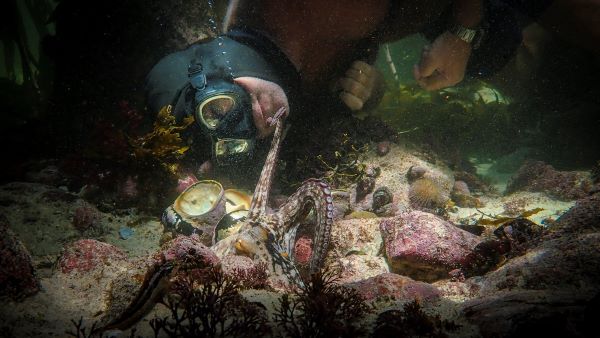
This dazzlingly photographed, at times surprisingly tender documentary centers on the burgeoning relationship between a middle-aged filmmaker and the titular cephalopod, which provides the former with new purpose in life. To say that veteran National Geographic helmer Craig Foster and the octopus “befriend” each other may sound dangerously close to anthropomorphizing the latter, but there is no better word at times. Indeed, some of the interactions between the pair are genuinely heartwarming.
By contrast, the early scenes capture the harshness and otherworldliness of the western South African coastal setting, specifically the submerged kelp forests, which in certain shots resembles outstretched arms rising up toward the surface. It’s where Foster, who visited the area as a younger man, returns after career burnout. He hopes that daily swimming and diving in icy cold water, which he undergoes without a wet suit or oxygen tank, will bring rejuvenation. Since he takes his filming gear along, there is plenty of remarkable underwater footage, including that of the octopus, first glimpsed ingeniously disguising itself as a pile of shells to fool and catch fish.
The creature is an awe-inspiring blend of speed and gracefulness, snatching its prey and jetting away in one fluid motion. It’s understandable that Foster would become enamored and return day after day, observing the octopus and gradually convincing it of his harmlessness. He studies cephalopods in his free time (on land) to try and understand this one better, his efforts culminating in a triumphant and unforgettable moment: the octopus trusts Foster enough to hold onto his hand as he rises to the surface for air.
We are also a party to the internal changes Foster experiences as a result of his time with this wild marine animal. He gains a newfound empathy toward the natural world and becomes specifically concerned for the octopus, given the abundance of predators in the vicinity of its den. While Foster frets considerably over whether he should intervene in the natural order, directors Pippa Ehrlich and James Reed make sure the film never becomes overly meditative or navel-gazing, leaning hard on the visceral sequences of the octopus evading predators or hunting; it’s the action hero to Foster’s thinking man.
In this way, My Octopus Teacher succeeds at being simultaneously thrilling and thought provoking, although it wouldn’t work nearly so well if both of its subjects weren’t compelling. Although Foster comes across as a bit entitled at first—he is financially well-off enough to essentially drop everything to play in the ocean for a few months—he’s willing to go to extremes for his obsessions, swimming bare-chested in order to bring himself closer to the creatures he’s observing. We also see his extensive research pay off when he begins tracking the mollusk on its home turf.
Speaking of the octopus, it turns out to be a true scene-stealer. Nature documentaries have a way of eliciting our respect for animals we might not otherwise feel kinship with by highlighting the odds they face to survive. This film is no different. Watching the creature navigate its short yet highly eventful existence, it’s impossible not to feel respect, especially when it appears to be cavalier and resourceful in a confrontation with a shark. (The average octopus has a life span of only about one year.)
But the film wisely avoids humanizing the creature too much and turning this into an undersea Marley and Me. Despite its obvious intelligence, we are constantly reminded that it is also a ruthless predator via a montage of it preying upon other creatures of the deep.
Overall, the technical aspects are first-rate. The editing is exceptional during the underwater pursuits, with barrages of fast cuts typically followed by longer takes that build suspense. But once again, the film’s main strength is the relationship between its two protagonists, who give us a moving and convincing argument that the separation between ourselves and other creatures—even those that appear the most unlike humans—may not be as wide as we think.






Leave A Comment